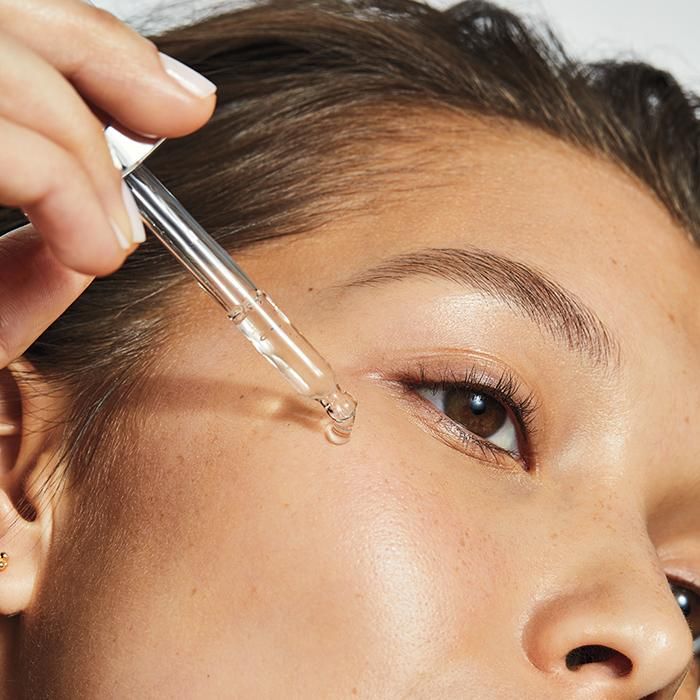Beauty...

By Melissa Epifano
If your skincare collection is starting to look a lot like your vitamins and supplements cabinet, you’re doing something right. Next to your antioxidant-heavy vitamin C and vitamin A might be a nice dose of vitamin E, but now it’s time to make room for another formula: niacinamide — a type of vitamin B that can do so much for your complexion.
New skincare ingredients come along all the time, but every so often an exceptional new addition makes an appearance and niacinamide is no exception. So who is this new face on the block? Continue below to find out.
Board-certified dermatologist and founder of AmberNoon, Erum N. Ilyas, MD, MBE, FAAD, says niacinamide is also known as vitamin B3 and its properties are quite extensive. “Niacinamide is hydrophilic, meaning it loves water or moisture. It has been shown to have multiple benefits for the skin, and it has anti-inflammatory and anti-itch properties as well as antimicrobial activity. It actually even has photoprotective qualities as well.”
The real question is, what won’t it help with? Niacinamide is a major powerhouse and can help with everything from inflammation and blemishes to dehydration and rosacea. You may already have one or two benefits in your head that you’ve associated with niacinamide, but its list extends far beyond what most people assume.
“Although this can hydrate the skin as well, most of its reputation is built on its anti-inflammatory effects,” says Ilyas.
“It’s been used as an add-on for acne treatments for years to reduce the redness and inflammation associated with breakouts, in addition to decreased oil production that contributes to the development of acne.” She also adds that niacinamide has been her number one most recommended ingredient over the last year, so if you’re suffering from maskne, dry skin from constant mask-wearing, or winter’s brutal elements, listen up.
Ilyas explains that patients with dry skin oftentimes deal with extra inflammation if they let the condition go on for too long. “Think of those times when you apply hand sanitizer and your skin just feels like it’s on fire!” she says. “With this concept, I always go back to this analogy: Think of your skin as not smooth like a wall, but more like a cobblestone street. When your skin dries out it’s as though the mortar that holds the bricks (your skin cells) together is breaking down.” This results in a prime target for outside elements, like pollution, wind, and the cold to worsen things.
Niacinamide is the hero product that’ll come in and calm things down while bringing much-needed moisture to your complexion.
But let’s take it a step further why don’t we? Jill Canes, a board-certified nurse practitioner and founder of Face Forward Medical Aesthetics, explains that niacinamide can brighten your complexion and help you target those fine lines and wrinkles that keep cropping up. She also stresses how great it is for combatting environmental factors, minimizing the appearance of pores, and “improving the skin’s barrier and help to repair past skin damage.”
Nearly every derm, esthetician, and skincare expert we’ve spoken with admired how well most complexions handle niacinamide, regardless of conditions, blemishes, or skin type. This truly is one of those ingredients that really works well for most people. But of course, it’s best to trial things in small doses before going all out.
Canes says that a patch test is smart, especially to rule out any possible allergies. “Niacinamide is generally safe for all skin types, but you may be more likely to experience an allergic reaction if you already have preexisting allergies,” she explains. “It’s possible that niacinamide can trigger your body to release histamine and you may want to do a patch test before starting to use niacinamide if you have preexisting allergies.”
As if it couldn’t get any better, niacinamide doesn’t require you to drastically change your skincare routine and it doesn’t mean you need to map out which products you can use with it on what days.
“You can use niacinamide with any other products in your skincare routine including retinol and other antioxidants,” says Canes. “You can also use it with hydrating ingredients like hyaluronic acid to increase the absorption of niacinamide.”
Where should it go in your lineup though? According to Ilyas, it’s flexible, and she mentions you can mix niacinamide with your moisturizer or work it in prior. “It is a lightweight serum and can often be applied first before other products are applied period.”